|
|
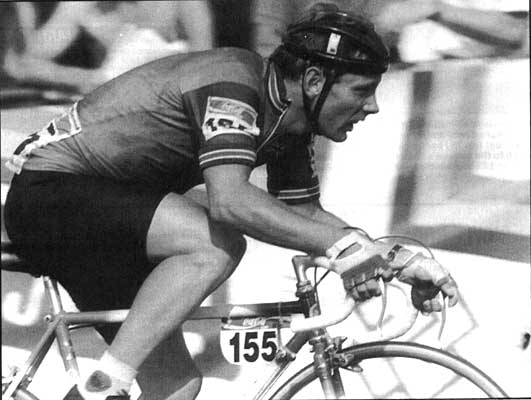 Richard
Vivien took a leaf out of Jeannie Longo's book by winning the world amateur
championship for France. To give hopes that the French might pull off a treble,
to match the Dutch in 1975, Vivien outsprinted six others to take the title
from West Germany's Hartmut Bolts and Denmark's Alex Pedersen. Seventh was Britain's
Deno Davie, still shattered from an earlier break when he seemed in sight of
a medal, only to be caught by Vivien's group within sight of the finish.
Richard
Vivien took a leaf out of Jeannie Longo's book by winning the world amateur
championship for France. To give hopes that the French might pull off a treble,
to match the Dutch in 1975, Vivien outsprinted six others to take the title
from West Germany's Hartmut Bolts and Denmark's Alex Pedersen. Seventh was Britain's
Deno Davie, still shattered from an earlier break when he seemed in sight of
a medal, only to be caught by Vivien's group within sight of the finish.
Davie's ride was only part of a great British effort. Paul Curran was also a hero on this hot day when he threatened to win the championship with two laps to go, only to die horribly in the attempt.
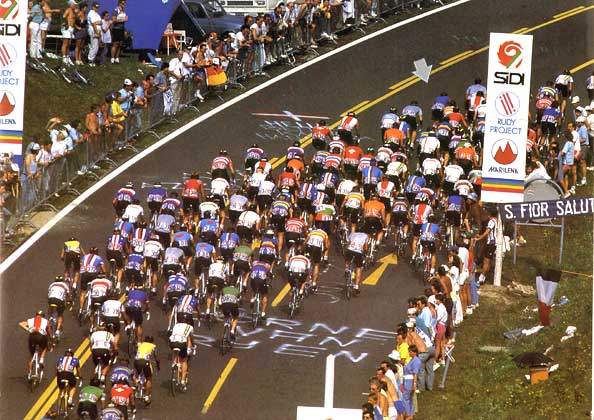 "I
cramped on the top corner of the first climb with two laps to go," said
Curran. "I was feeling great until then. I was just trying to keep out
of trouble, keeping an eye on things and making sure I was there."
"I
cramped on the top corner of the first climb with two laps to go," said
Curran. "I was feeling great until then. I was just trying to keep out
of trouble, keeping an eye on things and making sure I was there."
"The Pole and I were working well together and I really thought we could stay away, but on that lap I had to get off my bike and stretch my left leg. I was holding on to the barrier. I had no idea what brought it on.
"Deno shouted 'Up, Up' to me when he went past, and I shouted back 'You must be joking'."
Davie also had cramp. "My legs started to cramp up on the last hill," he said.
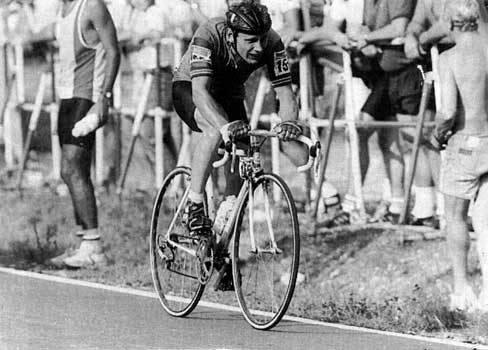 "I
just managed to get to the top of the hill with the others. I got over it and
had a crack on the descent, but it didn't work out. Kummer pulled me back and
just before the last corner the East German went. I got on his wheel and we
got the gap, but he looked over his shoulder, saw I was there and eased. I came
out of the corner towards the finish but I just didn't have it. I wanted so
much to be the world champion."
"I
just managed to get to the top of the hill with the others. I got over it and
had a crack on the descent, but it didn't work out. Kummer pulled me back and
just before the last corner the East German went. I got on his wheel and we
got the gap, but he looked over his shoulder, saw I was there and eased. I came
out of the corner towards the finish but I just didn't have it. I wanted so
much to be the world champion."
Although no medals were won by the British, it was a day to be proud of, for they made the race, producing attacking racing that made the foreign journalists start asking questions.
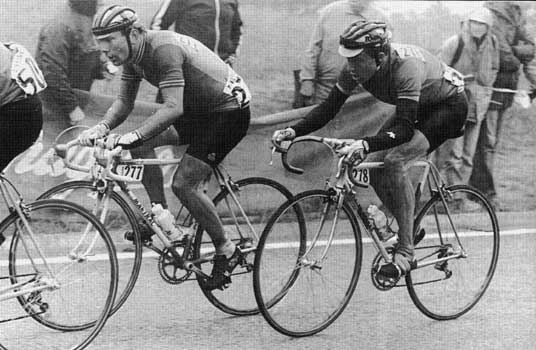 None
of the other Britons finished, Curran pulling into the pits with a lap to go
and others going further and further backwards until retirement seemed a more
attractive proposition.
None
of the other Britons finished, Curran pulling into the pits with a lap to go
and others going further and further backwards until retirement seemed a more
attractive proposition.
No one would have thought of Vivien as a possible winner before the race, for the bookies -still frowned on by the UCI - had given Russia's Djamolidine Abdoujaparov as the hot favourite.
A Total of 182 riders rolled from the start in hot sunshine, with the Russians forcing the pace immediately. Curran was well-placed, fifth from the front, then third as the road went uphill towards the pits.
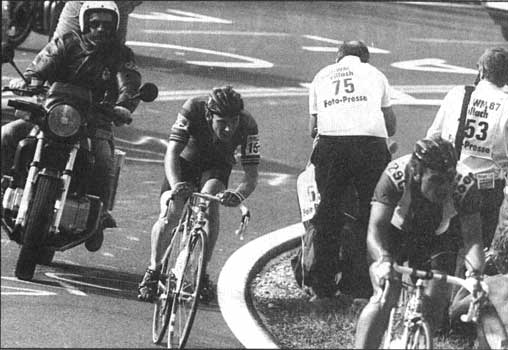 An
early attack repulsed and Curran was keeping a watchful eye open at the head
of the bunch.
An
early attack repulsed and Curran was keeping a watchful eye open at the head
of the bunch.
With such a big bunch, possibly the largest in a world championship field, there had to be a crash. A couple of dozen riders hit the deck, among them Britain's John Tonks.
Curran was safe at the head of the bunch, but the crash had sent Nick Barnes off the back into the second group as the first lap was covered in 28mph
News was coming through that Barnes was now 2-1 down, Wayne Randle 3-21, not much help for Curran who was shadowing every move, with Davie trapped at the back of the bunch. Vagn Scharling of Denmark attacked on lap six, and when he looked like succeeding, it was Curran who jumped across the gap. Quickly 10 men were in the lead only to be caught and only for Curran to try an abortive break himself.
Curran wasn't finished yet, he chased after Poland's Ludek Styks, remembering the Milk Race rider from the year that Curran finished fourth, and recalling the Pole's hill-climbing powers.
The next few metres saw a general tightening up by the men who mattered. Vaclar Toman was to make a name for himself and Czechoslovakia when he broke clear on the eight lap, and with no reaction from the bunch he went away to a maximum 1-21 lead. Four Czechoslovak jerseys found their way to the front of the bunch, and Toman's freedom was to last for another lap and half before he was pulled back. He has been away for 16 kilometres.
It was now lap 10 and Davie came to front for the first time, making an attack, then to be joined by Jens Heppner (East Germany), Ludek Styks (Czechoslovakia), Olaf Lurvik (Norway) and Andrej Teteriuk (USSR). Others joined and the short break was over.
Curran looked over his shoulder on lap 11, then stamped hard on the pedals and was gone. It forced a reaction from Uwe Ampler, the 1986 world champion, and Curran was brought back.
Next to go was Sweden's Magnus Knutsson who gained 23 seconds, increased to 55, then could only look down in dismay when his chain came off. He grabbed a spare bike, and as he did so then Liechtenstein's
Andreas Clavadetcher - who had been chasing - hit the back of the service car that had stopped for Knutsson.
And so the race continued, several small breaks - all unsuccesful until lap 12 when the big Pole Andrzej Mierzejewski got away. Curran chased, made contact, and the break was on.
There were still three laps to go, by Curran's standards that was too early, most of his wins in Britain had come with a lap or two to go, had he gone too early?
The Pole, his country's junior time trial champion in 1986, appeared full of fight, and the pair carved out a 21-second lead.
It was then that the questions started to come? How old was Curran? What had he done? And with the answers of British champion, Commonwealth Games champion, etc, it seemed that perhaps we were about to see the first British Amateur world champion since Graham Webb in 1967.
Such is the stuff of dreams however, for on the climb the Pole appeared to drop Curran who was under pressure. Davie had gone to the front of the chasing group. Suddenly at 157 kilometres Curran had blown. A gap had developed and the Pole was on his own.
Styks set up a chase after the Pole, Davie joined in. They made contact and hopes of a British medal rose again. The lead was never much, just 14 seconds as the bell sounded for the last lap. Behind, chasing, were Hartmut Bolts (West Germany), Alex Pedersen (Denmark), Mario Kummer (East Germany) and Richard Vivien (France). Vivien appeared to be the weak link in the chasing chain, struggling on and never once getting to the front.
Davie was going through a hard time and when Kummer attacked from the chasing group, he tried to hang on but was clearly suffering there were now seven in the lead and Davie was hanging on for grim death.
They swept under the road bridge to the finish and Vivien appeared for the first time. He was away and heading for the second French victory in two days. Davie could not summon up that little extra to gain a medal and came in seventh, last of the group.
Like Curran he had done his best, there could be no criticism.
RICHARD VIVIEN (France) 180km in 4.12.47; 2, Hartmut Bolts (West Germany); 3, Alex Pederson (Denmark); 4, A. Mierzejewskl (Pol); 5, M. Kummer (EG); 6, L. Styks (Cz); 7, D. Davie (GB) all st; 8, V. Kilmov (USSR) at 35sec; 9, T. Nielsen (Den); 10, J. Lahde (Fin); 11, A. Novosad (Cz); 12, U. Raab (EG); 13, F. Bontempi (It); 14, M. Traxl (Aus); 15, M. Diem (Switz); 16, J. Laffille (Fr); 17, E. Saebo (Nor); 18, C. Henn (WG); 19, H. Aruas (Cal); 20, A. Hainz (Aus); 21, J. Vernle (Bel); 22, W. Morgan (NZ); 23, B. Heylem (Bel); 24, O. Ludwig (EG); 25, J. Rejec (Cz); 26, G. Miller (NZ); 27, G. Rioux (Can); 28, T. Cordes (Hal); 29, J. Pavlic (Yug); 30, M. Lafls (Swe); 31, A. Seredluk (Pol); 32, Y. Wasdell (Can); 33, D. Spears (Can); 34, S. Papez (Yug); 35, B. Johannson (Swe); 36, F. Puttinl (Switz); 37, S. Kurmann (Switz); 38, E. Salas (Aust); 39, G Penko (Yug) all st.